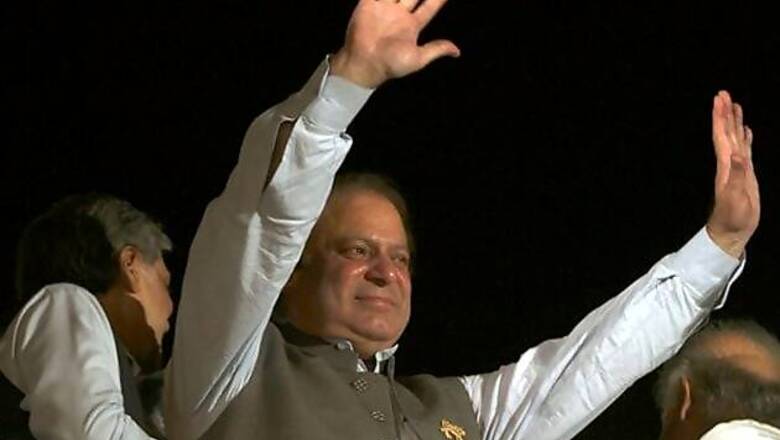
views
Pakistan Prime Minister Nawaz Sharif on Sunday, ordered an immediate halt to death sentences, including that of many hard-core militants, till he has discussed the matter with President Asif Ali Zardari, an official spokesman said.
Sharif made the decision after Zardari wrote to him, saying he wanted to discuss next week's hanging of two dreaded Lashkar-i-Jhangvi militants amid calls from rights groups to cancel the planned executions.
The two LeJ militants are Attaullah alias Qasim and Muhammad Azam alias Sharif who were convicted by a counter-terrorism court in July 2004 for killing a Shia doctor and are scheduled to be executed between August 20-22 this year.
The official spokesman was quoted by TV news channels as saying that since the date of the executions was approaching and the President was away from the country, the premier had directed the Interior Ministry to withhold the execution of the death sentences till he holds a meeting with Zardari.
The stay would last until Zardari returns from abroad to discuss the matter with Sharif, a statement said.
"In due deference to the wish of the president, it has been desired that all executions of death sentences may be held in abeyance till the discussion takes place," it said.
If the ruling PML-N goes ahead with the executions, it will end a five-year moratorium on death sentences that was put in place by the previous government led by Zardari's Pakistan People's Party.
The spokesman further said that reports that the President had stopped the implementation of the death sentences were incorrect.
The Pakistan government also halted the execution of a prisoner in Punjab province at the last minute.
"The process of execution of a death-row prisoner has been halted last minute at the district jail Vehari (some 200 kilometres from Lahore) in pursuance of orders by the president to this effect," District Jail
Superintendent Mohammad Ashraf said.
"All the arrangements were finalised for execution of a murder convict Munir Hussain when we received the presidential order in this regard," he told reporters.
The spokesman said the President had sent a letter to the Prime Minister in which he said he wanted to meet
Sharif to discuss the issue of long-pending death sentences of hundreds of prisoners.
Yesterday, presidential spokesman Farhatullah Babar told PTI that Zardari wanted to discuss the planned hanging of two militants next week with the Prime Minister.
The PML-N government has completed formalities to send the convicted militants to the gallows on Tuesday. It is not clear how Sharif will respond to Zardari's proposal.
Human Rights Watch and the International Committee of Jurists has sent an open letter to the PML-N government, asking it to renew the moratorium on the death penalty.
The government has said it is determined to go ahead with the executions of the LeJ militants despite threats from the Taliban to target the PML-N leadership if militants are hanged.
Since Zardari imposed the moratorium in June 2008, only a soldier convicted by a military court was hanged in November 2012.
According to official figures, Pakistan has over 7,000 prisoners on death row, one of the largest populations of prisoners facing execution in the world.
The International Commission of Jurists (ICJ) and Human Rights Watch had written a letter to Prime Minister
Sharif requesting him to review his government's decision to start execution of death-row prisoners.
"The International Commission of Jurists (ICJ) and Human Rights Watch are deeply concerned by your government's recently announced decision to resume executions in Pakistan. We urge you to renew the moratorium on executions with a view to abolishing the death penalty," the letter says.
Pakistan has had a moratorium on the death penalty since June 2008, with only the exception of soldier Muhammad Hussain's execution in November 2012 following a court martial.
"Your government decided not to renew the moratorium when it expired in June 2013. The ICJ and Human Rights Watch understand that an anti-terrorism court in Sindh province has issued 'black warrants' for the execution of two members of the banned sectarian and militant group Lashkar-e-Jhangvi, Attaullah alias Qasim and Muhammad Azam alias Sharif," the letter said.
The letter said the ICJ and Human Rights Watch believe that those who commit acts of terrorism should be prosecuted before competent, independent and impartial courts that meet international due process standards.
"We oppose the death penalty under all circumstances as an inherently cruel and irreversible punishment that violates the right to life," it said.
The debate on the abolition of the death penalty has intensified in Pakistan.
In 2008, the Pakistan Federal Cabinet adopted a proposal to commute death sentences to life imprisonment.
Before its term expired, the Pakistan People's Party-led government reportedly planned to table a bill in Parliament to commute death sentences to life imprisonment.
Currently, a petition calling for the commutation of death sentences is also being considered by the Supreme Court of Pakistan.
The resumption of the death penalty puts Pakistan in opposition to the global and regional movement towards the abolition of capital punishment.
Currently, 150 countries worldwide, including 30 states in the Asia-Pacific region, have abolished the death penalty in law or in practice.




















Comments
0 comment